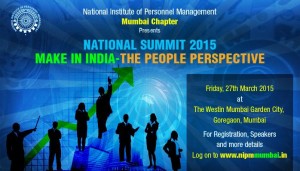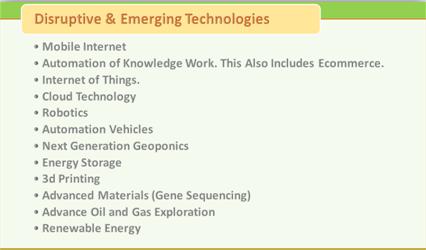
Make in India is not just a program , it can become a national campaign to improve innovation, intention, production and manufacturing in India. With the major focus on improving economy and employment opportunities, this new initiative is generating response from all major sectors in India. NIPM Mumbai arranged a national summit on the topic Make in India-The people perspective. Our guest blogger for today , Heet Pandya is sharing with us the main highlights and discussion from the event.
Make In India – The People’s Perspective
On Friday, 27th March 2015, National Institute of Personnel Management – Mumbai, organised a National Summit – “Make in India – The People Perspective”. This was one of the first HR summit on the emerging topic of Make in India. We have tried to report the key points discussed in the summit below.
The summit began with an enlightening discussion on developing ecosystems for a successful “Make in India”. India has the second largest workforce of 1.2 Billion after China. The manufacturing sector now contributes about 16-17 per cent and the government aims to increase it to 25 per cent by 2022. If this happens, then we will be able to create 100 million jobs to the nation. Mr. R. Krishnamurthy, Head of S. R. Mohan Das & Associates, stated that “manufacturing of 1 car generates employment for 20 persons. It is of critical importance to boom manufacturing in India”. Dr. Rajendra Mehrotra, former Sr. Specialist on Employers’ Activities for South Asia with ILO, believed that while one must focus on FDI, we need to ensure the country has eco-system that will sustain the development. We need to have skills that the MNCs will require.Prince Augustine, EVP – Group Human Capital & Leadership Development – Mahindra & Mahindra, stated that the “Make in India’ initiative must also focus on automation and improved farm machinery to better the yield of crops. Prosperity of farmers should be focused upon, otherwise, food will become very expensive”.
Critical theme to the discussion was a need for labour law reforms. The employment in the formal sector has shifted from 8% to 6.5%. The rest 93.5% of workforce does not receive any social benefit. The contract workers are not only underpaid but they also have no guaranteed employment.The recent changes that have taken place are ‘Business Friendly’. They possess a risk of affecting the rights of labour. According to Mr. Vrijesh Upadyay, General Secretary – Bhartiya Mazdoor Sangh, it is a misconception that Trade Unions are opposing Labour Laws. However, they need to be reviewed. The current reforms are a compromise the social securities provided to the employees. On the contrary, many critical issues like the complexity of labour laws, uniform definitions, etc. are ignored.
On Skilling, Manasi Kisloskar, Executive Director – Kirloskar Systems Ltd, exclaimed that “India has an energy in abundance. We need to convert this energy into tangible outcomes.” We have a skilled workforce of (approx.) 4 million. The current skill gap comprises of 49.6 million. Mr. Bijay Sahoo, President – H R at Reliance Jio Infocomm, discussed that research has identified 12 technologies that will create 30 trillion dollars in the coming time. Any talent among us in these 12 technologies, will fetch us the next fat salary.

Mr. K. N. Vaidyanathan, Chief Risk Officer – Mahindra and Mahindra, stated the following remedial measures:
- We need to set minimum standards for the organised as well as unorganised sector. To state an example, Germany has uniform standards for both.
- Better products will lead to better profits, which in turn, will lead to better social security benefits. Labour cost is hardly any cost in the total sales.
- Rather than perceiving technology as a threat, we need to see how HR fits in with the new technological wave.
With digitization in the world of work, believes Mr. Jayesh Pandey, MD, Talent and Organization Practice – Accenture, there is a major transformation in the way a talent is structured, led and managed. Mr. Pramod Joshi, People and Change Managing Consultant – KPMG, Gen Y is not asking what one can do for them. They are asking what else can be done for them. Gen Y is very clear about the aspirations they have. They want to pursue their passions. Today, is the era of ‘instant gratification’.
Gender Diversity and inclusivity was also a part of the discourse. Mr. Sumit Sen, GM Employee Relations – Hindustan Unilever, believed that Gender diversity is vital to any workplace. Not just because it’s a praiseworthy goal; it simply makes bottom-line business sense. This can be seen in the recent Gallup survey, which finds organizations with inclusive cultures can do better on several scores than those who aren’t inclusive:-
39% higher customer satisfaction / 27% higher profitability / 22% less employee turnover
According to Mr.Parameshwaran Balakrishnan, the role of HR is 4 fold
- Intellectual:feelings of growth.
- Spiritual : organizational values and those of people..
- Emotional: sensitivity in relationships and concern.
- Material: quality of life and fair compensation.
On Gender diversity, Sagorika Kantharia, Chief People Officer, Radio City, discussed that according to a recent research, women are better leaders than men due to their efficiency at communication, initiative and EQ. Ms. Shibani Belwalkar, LRN, held that is in the cultural domain that concept of gender has been constructed. She compelled the audience to rethink about their mental conception about definition of gender and sexuality and how culture creates a thin line between the Male and Female powers.
Lastly, Mr. Adil Malia, Group President – HR at Essar Group, discussed the Role of HR in the new era. He believes that HR has to develop analytical skills to understand the environmental signals for an effective change development process. HR has to identify what are the values that an organization nurtures, how stakeholder values need to be created and satisfied, and lastly, how the value chain can be more efficient, and lastly, to build a learning organization.
Overall, it was a great initiative byNational Institute of Personnel Management – Mumbai. The summit was attended right from HR leaders to enthusiastic students where key issues were raised for a sustainable tomorrow. Many more such initiatives awaited from the team! Kudos!
 Heet is a passionate dreamer, who expresses her insights through blogging. She believes that a valuable HR professional explores new concepts and learns to apply them.”
Heet is a passionate dreamer, who expresses her insights through blogging. She believes that a valuable HR professional explores new concepts and learns to apply them.”



1 Comment
Excellent report on the N.I.P.M. proceedings Meeta, thank you very much for sharing.